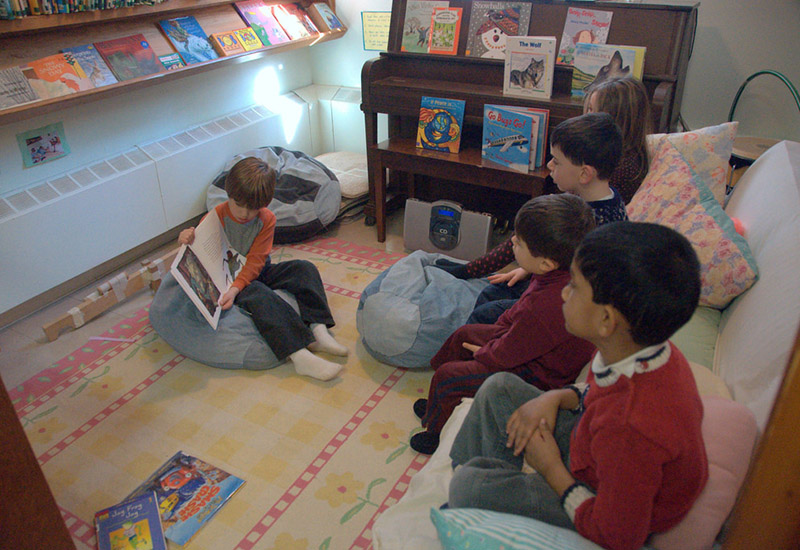How to Encourage a Discouraged Reader
LearningRx in Cary contributed to this article.
Cary, NC – When weak cognitive skills make reading hard, it can set off a chain reaction. It can dampen a love of learning, impact self-confidence, hinder opportunities, and make it harder to feel successful at school or work. What’s worse, kids who struggle often internalize the struggle. Instead of thinking, “Reading is difficult for me,” they can start believing self-defeating lies like, “I’m not as smart as other people” or “I can’t do anything right.”
“I’ll never learn how to read.”
“Everyone can do this but me.”
“I’m the stupidest kid in my class.”
We know just how amazing our really are. When they feel inadequate or discouraged, we desperately want to fix the hurt. So how can you help? Here’s what you can do when your child says heartbreaking words like these.
For starters, it’s important for parents to challenge those self-defeating lies—to teach children that their struggles do not define them or their potential. Of course, this is easier said than done. If reading never gets easier for a child, it can be hard for them to accept even the most encouraging words. The best course of action is to challenge the lies while at the same time your child experience reading progress and enjoyment.
How to help your child work through fears and shame that stem from learning struggles:
- Ask questions and substantiate your praise
When a child says something like, “I’m stupid” or “Nobody likes me,” it’s easy to shoot back with a 180-degree statement like, “You’re not stupid!” or “That’s not true!” But don’t just rush into countering that statement. Ask why he or she feels that way. Ask for specific examples. Similarly, don’t rush into praise. Instead of saying, “You’re so smart!” give concrete examples of why those self-defeating lies aren’t true. Use specific instances that highlight your child’s strengths.
- Teach your child not to believe everything they hear
Did someone say something demeaning to your child? Talk with them about some of the motives that can drive hurtful comments: jealousy, ignorance or the need to elevate oneself. We can’t control what other people say, but we can be gatekeepers of what our children internalize. With your child, come up with a list of more reliable indicators of who they are and their true value.
- Find and develop your child’s strengths and gifts
No one can be great at everything, but everyone can be great at something. Knitting? Frisbee golf? Sketching? Electronics? Singing? Horseback riding? Baking cookies? Knowing we are good at something – whatever that is – is a confidence builder that can keep us from feeling crushed or defined by life’s inevitable disappointments.
- Separate facts from shame-based interpretations
Let’s say your child feels “stupid” because of failing an exam. Help your child learn how to separate facts from shame-based interpretations of those facts. Fact: Your child failed an exam. Acknowledge the fact. Don’t sugarcoat it (“Maybe it won’t impact your final grade”) or deflect blame (“Your teacher must not have presented the information clearly”). Accept the fact, but don’t accept a shame-based interpretation it. Failing a test does not say anything about your child’s worth as a person. It doesn’t mean she isn’t bright. It doesn’t mean he is a failure as a student or a person. Practice with your child making fact-based statements minus the shame or self-deprecating commentary.
- Explore famously successful failures
Talk with your child about people who experienced great failures in life, and yet went on to accomplish amazing, innovative things. Albert Einstein didn’t speak until he was four and was even expelled from school. Stephen Spielberg was rejected from the University of Southern California School of Theatre three times. With your child, do an internet search of famously successful people who failed at first. Read through the list together and see what conversations it sparks.
Ways to improve your child’s reading skills, strengthen their motivation to read, and even change negative associations related to reading
- Encourage your child to read, well, pretty much anything
Books. Magazines. Comics. Websites. Blog posts. The back of a cereal box. It all counts! And your child might actually start to realize that reading can be fun.
- Make book-shopping fun
Plan a trip to buy used books at a thrift store, used bookstore, or garage sales. Give your child $10 to spend. As long as you find the content appropriate, let them choose whatever looks fun to them—even if it seems silly to you!
- Play games that improve cognitive skills
Skills like memory, attention, logic & reasoning and auditory processing play an important role in reading. Many store-bought games can exercise these cognitive skills. You may already have some at home:
- Simon: The original echo game, “Simon,” is great for auditory processing, memory and processing speed.
- Mastermind for Kids: This new version of an old classic improves logic & reasoning.
- Stratego, Chess and Checkers: For older kids, board games like Stratego, Chess and Checkers can work mental skills including planning, memory, comprehension and focus.
- Bop-It Extreme: This is a fun tool for building many cognitive skills, including auditory processing, logic & reasoning, processing speed, planning and selective attention.
- Slapjack: This age-old card game helps with divided attention, processing speed, short-term memory and visual processing.
- Music rocks!
Research has shown that learning to sing and/or play an instrument can improve reading performance. This is because both rely on strong auditory processing skills. Music lessons, anyone?
- Get an accurate measure of your child’s cognitive skills
If your child is feeling inadequate or discouraged in school, there may be a reason that is beyond his or her control. In fact, studies show that most learning struggles – including 85 percent of reading struggles – are caused by one or more weak cognitive skills.
Cognitive skills are the foundational skills the brain uses to think and learn, and include long-and short-term memory, visual processing, auditory processing and logic & reasoning. Extremely bright kids (and adults, too!) can have one or more weak cognitive skills that are making school, work or life harder than it needs to be.
LearningRx offers a quick – and free! – online survey that identifies potential cognitive weaknesses. They also provide an affordable in-office assessment that measures your child’s cognitive abilities, giving you valuable information about what skills might be holding your child back and how you can improve them.
- Consider cognitive training
With 80 centers across the country, 43 centers across the globe, and an average customer satisfaction rating of 9.5 out of 10, LearningRx is a pioneer in the one-on-one brain training industry. LearningRx uses game-like exercises that are both fun and challenging with a unique, one-on-one approach that’s like having a personal trainer for your brain. This summer, LearningRx is celebrating a milestone: 100,000 brains trained!
To learn more about LearningRx’s cognitive assessments and brain training, visit www.learningrx.com or call (919) 232-0090.
Story by LearningRx. Photos courtesy of Wellspring School and Sam Greenhalgh.





